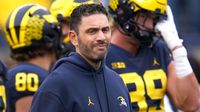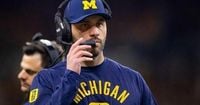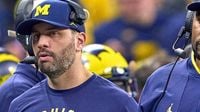New details have emerged in the federal investigation involving former Michigan assistant football coach Matt Weiss, who was fired in January 2023. Weiss faces charges in a 24-count indictment alleging 14 counts of unauthorized access to computers and 10 counts of aggravated identity theft, according to the United States Attorney's office Eastern District of Michigan.
The U.S. Justice Department disclosed that investigators have seized thousands of intimate photos and videos from Weiss's electronic devices and cloud storage accounts. Many of these images are described as candid and intimate, with some depicting victims naked or engaged in explicit sexual acts. This alarming revelation comes from the Justice Department's Mega Victim Case Assistance Program, which reported, "Thousands of candid, intimate photographs and videos have been seized from the defendant's electronic devices and from his cloud storage accounts. Many show victims naked. Some show victims engaged in explicit sexual acts," as noted in a statement via ESPN.
Importantly, this case is separate from the NCAA's ongoing investigation into the University of Michigan for alleged sign-stealing and advanced scouting practices. According to a release from the U.S. Attorney's office last month, acting United States Attorney Julie A. Beck, alongside FBI agent Cheyvoryea Gibson, announced that Weiss had gained unauthorized access to student athlete databases from over 100 colleges and universities maintained by a third-party vendor. From these databases, Weiss allegedly downloaded personally identifiable information and medical data of more than 150,000 athletes.
Weiss has pleaded not guilty to all charges, which stem from incidents occurring between 2015 and 2023. The investigation into Weiss began with a report from the University of Michigan Police Department in January 2023, which stated they were looking into an alleged crime at Schembechler Hall, the football program's headquarters. On January 5, 2023, an employee reported fraudulent activity involving unauthorized access to university email accounts.
Having joined the Michigan coaching staff in 2021 under head coach Jim Harbaugh as the quarterbacks coach, Weiss's tenure was marked by success, culminating in a 13-1 season and a spot in the College Football Playoff in 2022. However, the allegations against him date back to his previous role as an assistant with the Baltimore Ravens, where he spent over a decade (2009-2020) working in various coaching positions, including cornerbacks, wide receivers, and running backs coach.
Weiss's connections in the coaching world have also drawn attention. Jim Harbaugh, now the head coach of the Los Angeles Chargers, expressed his shock at the allegations, stating, "It's shocking," a sentiment echoed by his brother, John Harbaugh, head coach of the Ravens. Both coaches were taken aback by the unfolding situation when asked about Weiss at the NFL's annual spring meeting.
As the legal proceedings continue, Weiss finds himself at the center of multiple lawsuits. Parker Stinar, a lawyer representing some of the victims, is pushing for a judge to compel Weiss, the university, and an outside technology vendor to begin turning over evidence related to the case. The university has not yet commented on the lawsuits but is expected to respond formally in federal court within the coming weeks.
The case raises significant concerns about privacy and security, particularly within the realm of college athletics. With the alleged hacking of social media, email, and cloud storage accounts of over 2,000 athletes and more than 1,300 students or alumni from various institutions, the implications of Weiss's actions could have far-reaching consequences for those affected.
As the investigation unfolds, it serves as a stark reminder of the vulnerabilities present in digital security, especially in environments where personal information is increasingly stored online. The fallout from this case could lead to heightened scrutiny of security practices across college sports programs, as institutions work to safeguard their athletes' private information.
In the wake of these allegations, many are left wondering how such breaches of trust could occur within the sports community. The need for stringent security measures and ethical standards in coaching staff is now more critical than ever, as the ramifications of Weiss's actions continue to reverberate throughout the world of college athletics.
As the legal battle continues, Weiss's future remains uncertain. He has maintained his innocence, but the weight of the evidence against him is significant. With the legal landscape shifting rapidly, all eyes will be on the courtroom as this high-profile case unfolds, potentially reshaping the way college athletics approach issues of privacy, security, and trust.









